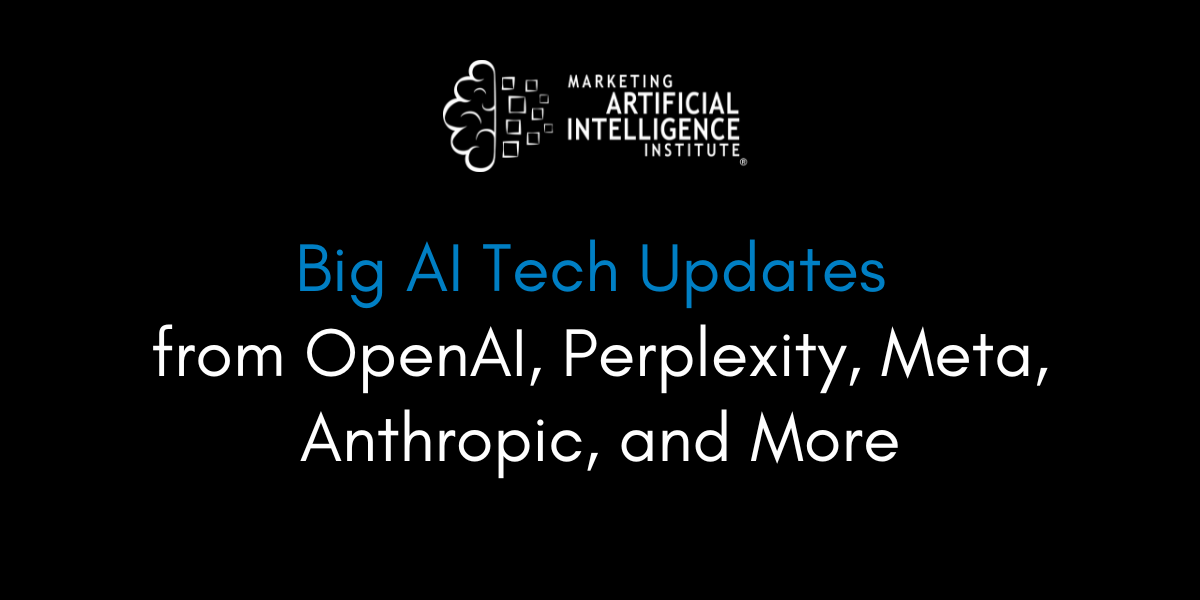The AI arms race is heating up, with a flurry of major updates from key players this week.
Here's your cheat sheet on what's new from OpenAI, Anthropic, IBM, and more.
OpenAI
First up, OpenAI is democratizing access to advanced ChatGPT features. The company is adding the ability to generate responses from the web, analyze data, use images and files, and leverage GPTs to the free version of ChatGPT. These capabilities were previously only available to paid users.
OpenAI is also formally relaunching its robotics team, which it had previously shuttered. The move positions the company to potentially embed its AI models into physical robots.
On Episode 101 of The Artificial Intelligence Show, Marketing AI Institute founder and CEO Paul Roetzer told me that OpenAI's return to robotics is particularly interesting, as it was one of the company's early research bets before it ran into hardware limitations.
"The language models have enabled us to now embody the intelligence within the robots," he says. "They've got the deal with Figure, which is one of the big robotics companies, where they're basically embodying ChatGPT into the robot."
Perplexity
Meanwhile, AI search startup Perplexity is reportedly in talks to raise around $250 million at a whopping $3 billion valuation. And the company just released Perplexity Pages, a feature that generates entire shareable pages based on user searches and research within the platform.
Meta
Not to be outdone by other AI leaders, Meta is considering launching a paid version of its AI assistant, dubbed Meta AI. The premium assistant would be a more advanced version of the free one available now.
Anthropic
Anthropic made waves by announcing that its AI assistant Claude can now use tools by interacting with external services and APIs.
Roetzer notes that tool use is another key unlock that every major research lab is pursuing. Being able to access different apps to achieve tasks is a major step forward.
The company also scored a major hire in Jan Leike, a leading AI researcher who recently left OpenAI's alignment team. Leike will lead a new superalignment team at Anthropic.
IBM
IBM also had its share of AI announcements at its annual THINK Conference.
The company unveiled a new class of Watson X AI assistants, including several coding assistants. It also announced IBM Concert, a generative AI tool for surfacing insights across a portfolio of apps, and plans to open source its Granite family of language and code models.
Showrunner
In the entertainment realm, Fable Studios has started releasing Showrunner, an AI app that lets users generate their own AI TV shows from prompts.
"Their vision for the future is personalized shows," Roetzer explains. "Instead of Netflix, where you go in and pick an existing show, you'll go in and say, 'I want to watch something like Harry Potter. I want it to be set in the Lord of the Rings land. I want these kinds of characters,' and it'll just build you a show."
He envisions a future where all content, from shows to songs to games, is consumer-generated through prompts and optionally shared with others.
"Everything's gonna be consumer generated through prompts, and then you can keep it to yourself or you can share it out," he predicts.
Suno
Last but not least, popular AI music generation tool Suno released version v3.5, which can now create songs up to 4 minutes long.
Mike Kaput
As Chief Content Officer, Mike Kaput uses content marketing, marketing strategy, and marketing technology to grow and scale traffic, leads, and revenue for Marketing AI Institute. Mike is the co-author of Marketing Artificial Intelligence: AI, Marketing and the Future of Business (Matt Holt Books, 2022). See Mike's full bio.



